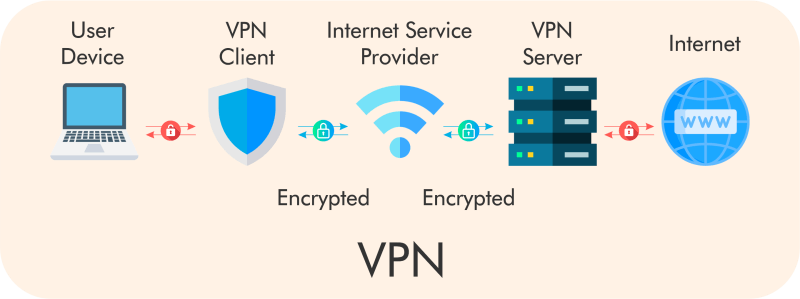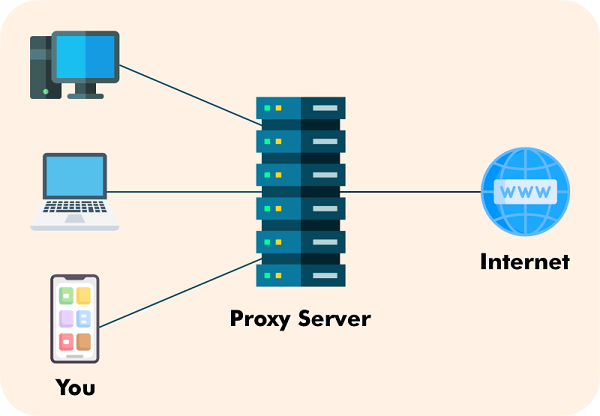Difference between VPN and Proxy ServerThe primary goal of VPN and Proxy is to offer a link between the host system and the distant system by concealing the host computer's IP address to protect it from intruders. The main distinction between a VPN and a Proxy server is that a Proxy server enables you to conceal the IP address and make your network id anonymous by masking your IP address. It includes capabilities such as network connection sharing, network data filtering, firewall, and data caching. In contrast, a VPN server has an advantage over a proxy since it creates a tunnel between the system and hosts over the public internet. A tunnel is constructed when any encryption protocol encapsulates packets. In this article, you will learn about the difference between the VPN and Proxy server. But before discussing the differences, you must know about the VPN and Proxy servers with their advantages and disadvantages. What is VPN?VPN is an abbreviation for "Virtual Private Network". It establishes a secure 'tunnel' between computer systems and the host server. It is a private network that links remote locations or users through a public network. The VPN network routes "virtual" connections from the third-party VPN provider to the remote site by using the internet. The ISP or government agency will only see that you have linked to the VPN and will not be able to track your actions or IP addresses. All data may be fully hidden with the aid of 128-bit encryption. How does a VPN work?The VPN client utilizes data encryption technology when interacting with the VPN. It allows you to access the website or data that you want to access. The VPN client conceals your data from your network and ISP, while the VPN software conceals your identity from the web app or webpage you are using. 
It improves your security when utilizing any public WiFi network. VPN services are extensively utilized to secure data when doing online shopping, banking, or sending formal emails over an open network. It also prevents your ISP or hackers from monitoring your traffic and web activities. Advantages and Disadvantages of the VPN serverThere are various advantages and disadvantages of a VPN server. Some main advantages and disadvantages of VPN are as follows: Advantages
Disadvantages
What is Proxy Server?A proxy server is a computer system that acts as a bridge between the system and the internet. Any communication sent via a proxy server seems to originate from its IP address rather than from the computer system. Your browser connects with the proxy, which connects the browser to the internet. Proxy servers connect to the internet via one of two protocols: SOCKS or HTTP protocols. Proxy servers serve as a link between the website and the computer system. Your web traffic is routed via a middleman, which is a remote system that assists you in connecting to the host server. How does the Proxy server work?
You may utilize a proxy server to access geographically restricted webpages and sites with the help of the internet. The proxy server connection is not encrypted. Moreover, it serves as a bridge between the system and the main server. As a result, an HTTP server offers you privacy and hides your identity from the site, but it never secures any important information. Advantages and Disadvantages of Proxy serverThere are various advantages and disadvantages of the proxy server. Some main advantages and disadvantages of a proxy server are as follows: Advantages
Disadvantages
Key Differences between VPN and Proxy servers
There are various key differences between VPN and Proxy servers. Some of the key differences between VPN and Proxy servers are as follows:
Head-to-head comparison between VPN and Proxy serversHere, you will learn the head-to-head comparisons between VPN and Proxy servers. The main differences between VPN and Proxy Servers are as follows:
ConclusionWhile proxy and VPN servers may appear to be the same, they are not the same thing. VPNs offer higher security as they encrypt traffic. A VPN is the best choice for organizations that deal with sensitive data and require maintaining their internet activity anonymous. A proxy server may be helpful for companies that wish their employees to browse the internet anonymously. It also permits them to see which websites their employees are visiting and ensures that they have access to websites ordinarily blocked in their jurisdiction.
Next TopicDifference between
|
 For Videos Join Our Youtube Channel: Join Now
For Videos Join Our Youtube Channel: Join Now
Feedback
- Send your Feedback to [email protected]
Help Others, Please Share










